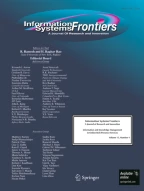Abstract
As we arrive at the millenium, the literature is filled with predictions and forecasts of the state of affairs in the 21st century. Most of these forecasts are single point prognoses. This paper uses scenario-building ideas to describe a richer set of possible states of Information Systems in the year 2010. The scenarios are integrative and consider a set of possible events and their impacts. Two major driving forces: (1) telecommunications development and (2) social acceptance of information systems (IS) are assumed to define the scenario space. Based on these driving forces, four scenarios are created: Utopian, Dystopian, Status Quo, and Technology. The Utopian (ubiquitous telecommunications, high social acceptance of IS) and Dystopian (limited gains in telecommunications, low social acceptance of IS) scenarios are described in detail. The scenarios provide a basis for assessing the frontiers of information systems.
Similar content being viewed by others
References
Coats J, Mahaffie J. et al. Technological Forecasting:1970–1993. Technological Forecasting and Social Change 1994;47:23–33.
Coats J, Mahaffie J, Hines A. 2025: Scenarios of US and Global Society Reshazped by Science and Technology. Greensboro, NC: Oakhill Press, 1997.
Dalkey N, Helmer O. An Experimental Application of the DELPHI Method to the Use of Experts. Management Science 1964;9(6):458–467.
Helmer O. Cross-Impact Gaming. Futures 1972;4(2):149–267.
Kling R, Lamb R. Analyzing Alternate Visions of Electronic Publishing and Digital Libraries. Scholarly Publishing: The Electronic Frontier. R. Peek and G. Newby. Cambridge: The MIT Press, 1996;1:17–54.
Mehta M, Darier E. Virtual Control and Disciplining on the Internet: Electronic Govermentality in the New Wired World. The Information Society 1998;14(2):107–116.
Morrison J. The Future Tool Kit. Across the Board 1994;3(1):18–25.
Schoemaker P. Scenario Planning: A Tool for Strategic Thinking. Sloan Management Review 1995;36(Winter):25–40.
Stout D. Use and Abuse of Scenarios. Business Strategy Review 1998;9(2):27–36.
Author information
Authors and Affiliations
Rights and permissions
About this article
Cite this article
Gray, P., Hovav, A. Using Scenarios to Understand the Frontiers of IS. Information Systems Frontiers 1, 15–24 (1999). https://doi.org/10.1023/A:1010077128073
Published:
Issue Date:
DOI: https://doi.org/10.1023/A:1010077128073
